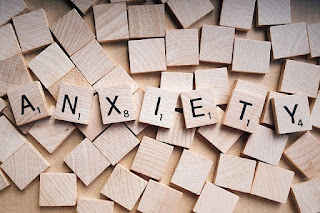My philosophy
I work with adults, and part of being an
adult is taking charge of your life. If you have suicidal thoughts or are
sometimes actively suicidal, the way forward is to empower yourself. That
starts by understanding what is going on, and what you can do to help yourself.
Q: If I have a
suicidal thought, am I crazy? Or doomed to die?
A: Absolutely not! It’s surprisingly common to have thoughts like, “I wish
I didn’t waken up in the mornings” or “I just want out.” For most people, it’s
purely a stress reaction, the equivalent of the brain saying, “Eeeeeek! Get us
out of this!”
It can also be depression lying to you.
Depression is mean and it whispers nasty things. Anxiety is the same.
The main thing to consider here is that not
all thoughts can be taken at face value.
So if you just have the odd thought here and
there, don’t worry. Have a chat with a therapist like me, and we can sort out
what’s going on.
Q: I think about it
often, though, and it’s more than a stray thought. I’d not do anything about
it, probably, but should I be worried?
A: Hmmm, I’d be asking when these thoughts come. Like, is it a reaction to
something? If you have a toxic boss, a difficult family, or other life
circumstances, it may be that you are sad or have depression. This situation
can lead to suicidal thoughts.
Or it may be depression or anxiety. These
conditions don’t just feel bad—they create a false, nightmare world and
convince you it’s real.
Many people living with these conditions
don’t realise the world they’re seeing isn’t real. So they live for years with
those nasty voices whispering at them.
If you have repeated episodes of dark
thoughts, please know that you can help yourself!
This requires digging around to see what’s
going on, whether it’s situational, a condition or both. That’s not something
anyone can do, so you want to talk to a professional.
See a level 7 qualified person, someone with
a Masters Degree in Counselling or Psychology that includes a minimum of 300
hours supervised practice.
(Yes, that includes me!)
Q: I have repeated
episodes of suicidal thoughts and sometimes I am actively suicidal. What do I
do?
A: It starts with planning your support before you reach crisis
point. You can kick off straight away by putting together a Suicide Safety
Plan. You can Google that and download a template, or you can message me
and I’ll send you one.
A Suicide Safety Plan is where you
write down your resources. Here’s mine:
Safety Plan
Feeling suicidal is the result of
experiencing extreme pain.
I have a plan to reduce pain and increase coping resources.
I know that with support and time, these thoughts will pass.
When they pass, I can put energy into sorting out problems that have
contributed to this episode.
For now, all I need to remember is that these feelings will not last forever.
Also, I have help and support.
- What I need to do to reduce the risk of me
acting on the suicidal thoughts
- What warning signs or triggers are there that
make me feel more out of control?
- What have I done in the past that helped? What
ways of coping do I have?
- What I will do to help calm and soothe myself:
- What I will tell myself (as alternatives to
the dark thoughts):
- What would I say to a close friend who was
feeling this way?
- What could others do that would help?
- Who can I call? LIST THREE PEOPLE YOU CAN CALL
WHEN YOU'RE IN DISTRESS.
- A safe place I can go to: DETAILS HERE
- If I still feel suicidal and out of control:
- I will call the national suicide line.
DETAILS HERE
- I will go to the Emergency Room of a
public hospital. DETAILS HERE
- If I can't get there safely, I will
call emergency services.
(e.g., 999 in the UK and Malaysia, 112 in Europe/EU, 911 in the US,
Canada and Mexico)
Second, set up a relationship with a
therapist. Now, therapists typically cannot offer active suicide support
because we can’t work 24/7. We’re human. Also, we have a practice to run so
when you are in crisis, we can’t drop everything (other clients!).
In a crisis, you must access a service that
is manned 24/7. That’s usually a suicide hotline or your nearest public
hospital.
However, you can use a therapist for a few
sessions to talk through your safety protocols, or you can plan for low periods
and arrange to have some extra support during those times.
My clients who suffer from repeated episodes
of depression/anxiety where they are actively suicidal use sessions for
support. It gives you a space to get real about what’s going on without guilt,
shame, or pressure to pretend you're fine. Sessions are a boost that can help
you manage better when the lows hit.
If you can’t afford therapy, look at
charities near you and try and set up a personal connection with a case worker
there. Again, they won’t be working 24/7 so it would be used only for sessions
where you can share and be supported.
Q: I’m worried that if
I tell a therapist I’m suicidal that they’ll lock me up or report me to the
police.
A: These fears are common but how realistic they are depends on where you
live.
If suicide is a crime in your country, try
searching anonymously or asking support forums what’s typical in your area. If
they won’t say, reach out and ask about, “My friend who is sometimes down…” and
see what they say. Go with your gut.
If suicide is not a crime in your country,
then think about local resources. Do you know of people in your neighbourhood
who have been treated badly after sharing their suicidal thoughts? If so, act
as above and google discreetly before deciding who to trust.
But if you’re relying on horror stories from
a film, please think again. TV often dramatizes these issues, so it's not
always a reliable source.
Consider this: facilities that support actively suicidal
people require a locked ward that is manned 24/7 by nurses, doctors, and case
workers. It’s super expensive!
In many countries, it takes an awful lot of
advocating before you can access that kind of service. Most of the time, they
talk to you for some hours, give you medication and then send you home under
the care of someone you trust, like a friend or relative.
If you are worried, Google and also check
social media support resources and ask what the protocol in your country is for
actively suicidal people. Anonymously, of course, so you’re safe.
Q: And how do you work
with suicidal clients?
A: I don’t provide crisis support or 24/7 services as I work online
internationally and alone. When your crisis hits, I may be asleep or in session
with another client.
If you’re in immediate danger, please contact
emergency services or a suicide crisis line.
I do work with people who struggle with
suicidal thoughts and want to build long-term resilience. Usually, we see a dip
coming and we plan for it.
But if you’re my client and you become
actively suicidal and you won’t use the safety plan
(Like, ‘I’m going to kill myself now and you can’t stop me’)
I’ll contact your emergency contact, the person you have stipulated in our
agreement. This person lives close to you and can sit with you or take you to
see a doctor.
I disclose the danger, (‘Kim is suicidal,
please take them to see a doctor’) but I won’t tell them details of our
sessions. These stay confidential!
Q: What if I don’t
have people I trust or anyone near me?
A: Then I won’t work with you. Why? Because that’s not safe, and I don’t
do unsafe work.
Final thought
If you have suicidal thoughts or are
sometimes actively suicidal, please know there is a path forward. Many people
recover from suicidal thinking and go on to live deeply meaningful lives.
Start by setting up your safety nets. You
deserve to be happy!
Note: related post, Suicide Counselling in Developing Nations. When a Friend or Loved One Is Suicidal: What Can You Do If There’s No Hotline, No Doctor, No System?









